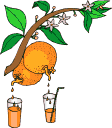Shake It Up

Looks like the calcium and phosphorus in milk and yogurt may offer some protection against colon cancer. Both minerals help keep benign tumors from turning malignant. Blend together half a cup of low-fat yogurt, half a cup of nonfat milk, half a cup of frozen berries, and a splash of orange juice for a fruity, frothy summer treat.
Some benign colon tumors can become malignant, so reducing that likelihood is critical. In a 2005 study, women who consumed more than 1,200 milligrams (mg) of calcium and more than 1,600 mg of phosphorus each day had the lowest risk of developing benign tumors and the lowest incidence of colon cancer. Hooray for cows!
The combination of milk and yogurt in our tasty shake gives you 400 mg of calcium and 300 mg of phosphorous. That's a great start! Add a multivitamin (it'll add at least 100 mg more of each mineral), snack on some almonds, or enjoy a meal that includes lentils, beans, peanut butter, or peas and you'll be in great cancer-fighting shape.

Looks like the calcium and phosphorus in milk and yogurt may offer some protection against colon cancer. Both minerals help keep benign tumors from turning malignant. Blend together half a cup of low-fat yogurt, half a cup of nonfat milk, half a cup of frozen berries, and a splash of orange juice for a fruity, frothy summer treat.
Some benign colon tumors can become malignant, so reducing that likelihood is critical. In a 2005 study, women who consumed more than 1,200 milligrams (mg) of calcium and more than 1,600 mg of phosphorus each day had the lowest risk of developing benign tumors and the lowest incidence of colon cancer. Hooray for cows!
The combination of milk and yogurt in our tasty shake gives you 400 mg of calcium and 300 mg of phosphorous. That's a great start! Add a multivitamin (it'll add at least 100 mg more of each mineral), snack on some almonds, or enjoy a meal that includes lentils, beans, peanut butter, or peas and you'll be in great cancer-fighting shape.


 The WELL diet serves up weight loss with a side of blood pressure control.
The WELL diet serves up weight loss with a side of blood pressure control.